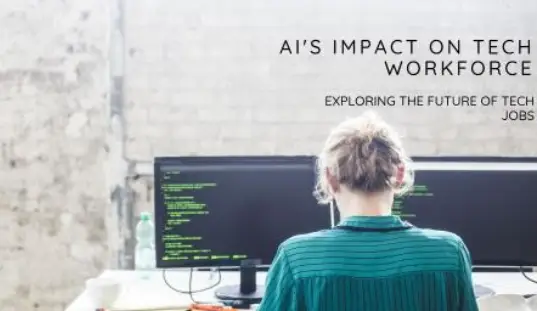Tech Industry Jobs and hiring trends have changed significantly in recent years due to the rapid innovation of AI and remote workforce advantages. AI is playing a pivotal role in reshaping the employment dynamics. This industry analysis delves into the state of tech jobs, the impact of AI, and how professionals can navigate these trends to stay competitive.
According to data from Layoffs.fyi, 470 tech companies have laid off around 141,145 employees in 2024 as of this writing, on top of the 428,449 tech workers who were laid off in 2022 and 2023. Notable layoffs from this year include Dell, which laid off 5% of its workforce in March, amounting to nearly 6,000 employees.
1. Current State of Tech Industry Employment
The tech industry has always been a dynamic job market. However, the recent wave of layoffs at major companies like Amazon, Meta, and Alphabet has sparked concerns about job security, particularly in the wake of the global pandemic and economic uncertainties. The transition to remote work and the accelerated adoption of AI have further transformed the industry’s employment landscape.
Tech Industry Jobs in Flux: With many companies shifting their focus toward efficiency and cost-cutting, traditional roles such as customer service and manual software testing are being downsized.
Remote Work: The remote work trend continues to thrive, allowing companies to tap into a global talent pool while reducing costs. However, remote jobs are not immune to disruption by AI.
2. AI’s Role in Workplace Transformation
AI and automation are fundamentally altering how work is done in the tech sector. While AI is reducing the need for some positions, it’s also driving the creation of new roles that require advanced skills.
AI Impact: Roles that involve repetitive tasks, such as data entry, support services, and even some forms of development, are increasingly being handled by AI systems.
Workplace Transformation: Industries relying on data processing, customer interaction, and infrastructure are rapidly adopting AI-powered solutions to cut costs and increase productivity.
3. Emerging Job Roles and Skill Requirements
Although some traditional roles are being automated, the rise of AI is also creating new job opportunities. Companies are now seeking highly specialized skills that focus on developing, managing, and maintaining AI systems.
In-Demand Roles: AI engineers, data scientists, machine learning specialists, and cloud infrastructure experts are among the most sought-after professionals in today’s job market.
Skill Requirements: Professionals looking to stay relevant need to upskill in AI-related areas, including programming languages like Python, AI model development, and data analytics.
Career Transitions: Many tech workers are shifting their careers toward roles in AI, cybersecurity, and DevOps, fields that are seeing rapid growth.
4. Company Case Studies
Several tech companies are at the forefront of leveraging AI to reshape their workforce and business strategies. These case studies offer insights into how industry leaders are balancing layoffs with new hiring trends.
Amazon: Despite significant layoffs, Amazon is aggressively hiring AI and cloud computing experts to maintain its dominance in the tech space.
Meta: Meta’s investment in the metaverse has led to layoffs in certain departments but expanded opportunities for professionals in augmented reality (AR), virtual reality (VR), and AI.
Alphabet: Google’s parent company is focusing on AI-driven advertising and cloud services, trimming its workforce in traditional roles but expanding in AI-heavy areas.
5. Expert Predictions and Insights
Industry experts predict that AI will continue to reshape the tech workforce, with both positive and negative effects.
Predictions: According to analysts, while some jobs will disappear due to automation, AI will create a net positive effect on employment in tech by opening new, highly skilled positions.
Insights: As more industries integrate AI, the need for skilled professionals will continue to grow. Those with expertise in AI ethics, machine learning, and AI system implementation will be in high demand.
6. Action Points for Professionals
For those in the tech industry, adapting to these changes is essential for career longevity.
Upskill: Focus on learning AI, data science, and related technologies to stay competitive.
Networking: Engage in AI and tech communities, both online and in-person, to stay updated on trends and job opportunities.
Career Shifts: Be open to transitioning into emerging roles where your existing skills can complement AI-related technologies.




















